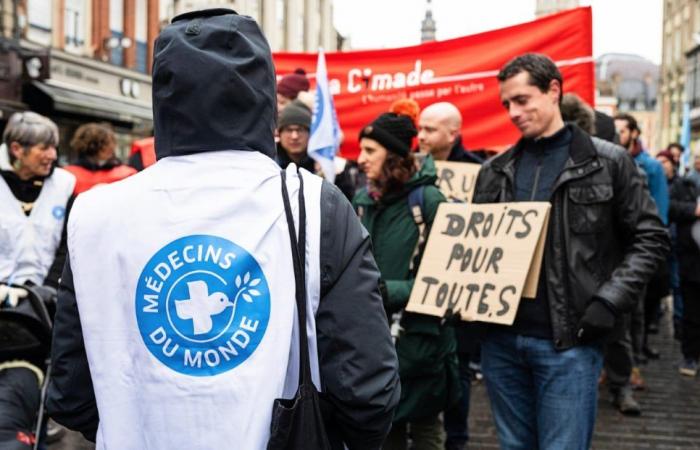Only 6% of the tens of thousands of obligations to leave French territory issued each year are executed. A juggernaut administration, hyperactive associations and a fastidious “rule of law” block their application. The migration issue is however security and moral.
The non-execution of the famous obligations to leave French territory (OQTF) is one of the symbols of the powerlessness of the State regarding the security of the French and the effective control of its borders. It has recently highlighted the poor maintenance of profitable diplomatic ties with the countries from which those subject to these OQTFs come.
This administrative measure is however simple and clear at first glance: a foreigner in an irregular situation or presenting a disturbance to public order must leave the territory. Except that this obligation has been disguised as a invitation disguised. The individual must leave the territory within 30 days, spontaneously and by his own means… period during which he will be able to file an administrative appeal through associations filled with public money and thus block any execution of the administrative decision.
Congested courts
Despite the effects of announcements from successive ministers, the execution rate of the approximately 130,000 OQTFs delivered each year stagnates at a paltry level of around 6%, and France is sinking deeper and deeper into a migration and security crisis. where the complacency of the State ends up fueling permanent insecurity throughout the territory. The lack of involvement of the Quai d’Orsay, in charge of cooperation with the countries of origin, for obtaining consular passes, is inexplicable.
This migratory fiasco has plunged France into total anomie in which it is no longer able to apply its own rules due to ineffective procedures, which are diverted from their primary purpose by legal complexity, permanent legal appeals and totally saturated administrative courts. by a figures policy imposed by Beauvau. Prefectures regularly and improperly use matrices to draw up these measures and gain speed but not efficiency because the particularities of each file are not considered. It should be noted that individuals, perfectly integrated into society, were the subject of an OQTF while they were waiting for their appointment at the prefecture to renew their expired resident card… This is common sense. in this area, so much effort should be concentrated on undesirables not inserted, those guilty of crimes or misdemeanors or individuals listed S because of their dangerousness! But to deport these individuals, the road is unfortunately winding mainly due to our own laws.
Our bureaucratic and humanitarian logics pushed to paroxysmal heights to the detriment of the security of the French have tragic consequences: the murderer of the professor in Arras, Mohammed Mogouchkov, or the supposed criminal of Philippine, should never have been on the ground French at the time of their act. And they are far from being isolated cases as the news abounds with these tragedies.
Also read: Philippine case: How did suspect Taha O. end up in the wild?
This first individual, despite his links with terrorist activities, was able to remain in France through the frenetic agitation of furious associations, put on a drip of public money, and which at the time were agitating international conventions and treaties to ensure the failure of the OQTF.
The second individual suspected of Philippine’s death had already been convicted by the Juvenile Assize Court for a previous rape and imprisoned in France. Detained in an administrative detention center (CRA), upon his release from prison, for 75 days, i.e. the legal period notwithstanding an exceptional possibility of extending by 15 days according to criteria not met in the present case, the individual was able to be authorized to leave the CRA… completely legally. This ludicrous measure, imposed by an unsuitable legal framework, had to be taken when the French administrative authorities were unable to obtain a consular pass from Morocco in time. Yet another admission of failure leading to a double tragedy: the disappearance of a young girl in atrocious conditions and respect for a completely outdated legal framework.
Faced with this situation, it is urgent to intervene and disrupt the legal and administrative framework to preserve our social contract.
To satisfy an imperative for firmness and respond to this emergency, the new Minister of the Interior Bruno Retailleau announced a series of measures: extension of the maximum duration in CRA, end of the circular known as “ Valls » of 2012, financial agreements with countries of origin, financial pressure, non-issuance of visas for non-cooperating countries… These jumbled measures could have an effect on immigration but not necessarily on the execution of OQTFs .
For example, the circular known as “ Valls » of 2012 defines the contours of application of exceptional admissions during the stay provided for by the Code of entry and stay of foreigners and the right to asylum (CESADA). Before this circular, prefects could apply the CESADA by interpreting in a discretionary manner a text that was far too vague at the risk of completely distorting it for ideological purposes. The new circular soon to be called “ Retailleau » will regulate these exceptional admissions legally provided for in the same way and will surely allow the margin to reduce them but will in no case be able to prohibit them. In addition, these exceptional admissions, numbering around 35,000 per year, concern, for a third, workers in so-called shortage professions such as catering or construction and of which France obviously does not have the luxury, to happen…
The extension of the CRA detention period from 90 to 210 days will have to be adopted in the National Assembly in the event of consensus on the subject, and will be useful to a lesser extent if the countries of origin issue the passes. consulars. But if at the end of 210e day the “LPC” is not issued, the individual will be legally released or placed under house arrest…
Impotence and guilty laxity
The only way is therefore at the European and international level, in addition to having sufficiently strong means of pressure to force countries to take back their nationals while not penalizing French economic and geopolitical issues. Here again, the return of the immigration ministry dissolved in 2010 seems a serious avenue for concentrating the state’s resources in order to respond to this national issue. Reforming the Schengen agreements, which currently allow an individual with a short-term visa to move freely throughout the signatory countries, without control, does not seem to be on the agenda even though it is a matter of a priority.
The French no longer expect ministers to chant announcements without concrete actions to the point of falling into a sort of totally amphigouric speech that they themselves no longer understand. At the international level, France must shake up, without obviously abandoning, the chain protection regimes imposed by international and European treaties, controlled by the Court of Justice of the European Union – whether they are linked to the state of health, family ties or humanitarian conditions – and which currently paralyze any attempt at execution. These devices, which were originally intended to protect the most deprived from arbitrary decisions, have become systematic loopholes to avoid removal.
Finally, what should we think of a State which, in the name of humanitarian principles, administrative burdens or sometimes a lax and deadly ideology, endangers the lives of its own citizens and sometimes condemns them to a disastrous fate?
This helplessness, combined with culpable laxity, is an affront to victims, often deprived of recourse in the face of insolvent attackers, but also a betrayal of sovereign duties. The State can no longer shirk its responsibilities and no longer recognize its fault for its inability to protect the French. If the administration fails to protect its citizens by not implementing these removal measures, it must bear responsibility and compensate the victims. Beyond the financial question, it is a moral imperative. Failing to expel illegal aliens, particularly those presenting a serious threat to public order, constitutes a breach of equality before public charges. We must put an end to the effects of announcements and finally act concretely to ensure the security of the French, which should be the cardinal principle of a common policy. But the true truth is the one that voters and supporters will believe, unfortunately.
Causeur lives only through its readers, this is the only guarantee of its independence.
To support us, buy Causeur on newsstands or subscribe!






